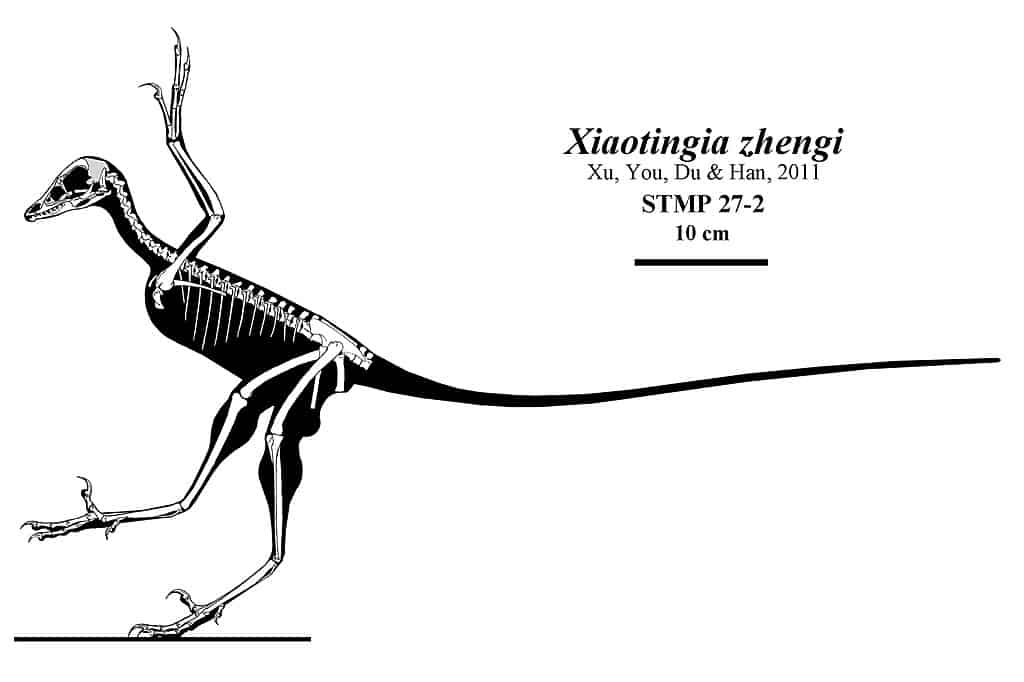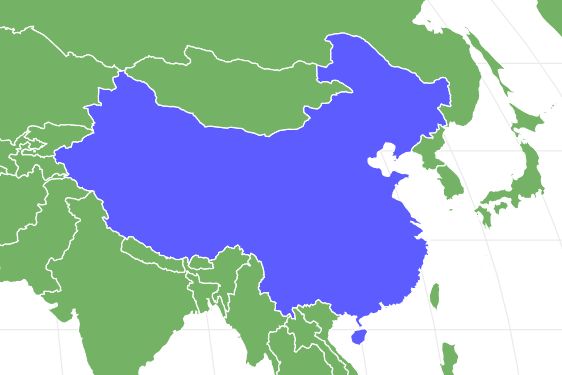Xiaotingia used its feathery hindlimbs for short-distance flights
Advertisement
Xiaotingia Scientific Classification
- Kingdom
- Animalia
- Phylum
- Chordata
- Class
- Reptilia
- Order
- Ornithischia
- Family
- Anchiornithidae
- Genus
- Xiaotingia
- Scientific Name
- Xiaotingia zhengi
Read our Complete Guide to Classification of Animals.
Xiaotingia Conservation Status
Xiaotingia Facts
- Prey
- Insects
- Main Prey
- Insects
- Name Of Young
- Nestling or hatchling
- Fun Fact
- Xiaotingia used its feathery hindlimbs for short-distance flights
- Most Distinctive Feature
- Long feathers on their limbs that they most likely used for short-distance flights
- Distinctive Feature
- Forelimbs were longer than their hindlimbs
- Habitat
- Terrestial and arboreal habitats
- Diet
- Carnivore
- Favorite Food
- Insects
- Type
- Dinosaur
Xiaotingia Physical Characteristics
- Skin Type
- Feathers
- Weight
- 1.8 lbs
- Length
- 60 cm (23.6 inches)
- Venomous
- No
- Aggression
- Low
View all of the Xiaotingia images!
Birds are the closest thing to a dinosaur we can find around. While giant dinosaurs like the T. rex may not look anything like modern-day birds, smaller dinosaurs like the Xiaotingia are more similar to their descendants. Pronounced as “zhow-tin-gee-ah,” this genus of bird-like theropod dinosaur lived from the middle to late Jurassic Period in the western Liaoning region of China.
Description and Size
The Xiaotingia is a genus of extinct dinosaurs that lived during the Late Jurassic in an area that is now present-day China. Only one species, Xiaotingia zhengi, is known. This dinosaur’s generic name and specific name are in honor of paleontologist Zheng Xiaoting.
The Xiaotingia was a relatively small primitive dinosaur. It was similar in size and structure to the popular Archaeopteryx. With an average length of about 23.6 inches (60 cm) and an average weight of 1.8 lbs (0.8 kg), Xiaotingia would be about the same size as present-day pigeons or hens.
Like birds, most of this dinosaur’s body, especially the head, forelimbs, hindlimbs, and nape, were covered in feathers. The feathers were up to 2.16 inches long. Long pennaceous feathers were also present on the dinosaur’s tibia and metatarsus. Due to the abundance of long feathers, experts think this dinosaur was capable of short-distance flights, using its hindlimbs as a type of wings.
Xiaotingia had a long femur and a shorter humerus. This means their forelimbs were longer than their hindlimbs. They were bipedal, using only their hindlimbs to stand and walk. Experts think their forelimbs were similar to that of modern birds, and they used them for flapping. Xiaotingia had long feathers on its femur. They had less than 10 teeth in their mouth, with a dentary formula similar to that of basal birds.

Xiaotingia was a small dinosaur, averaging around 23.6 inches in length and less than two pounds.
© – License
Diet — What Did Xiaotingia Eat?
Scientists believe present day-birds are descendants of deinonychosaurs. This group of Jurassic Period dinosaurs had a predominantly carnivorous diet. Since Xiaotingia was related to them, they probably also had a carnivorous diet. Insects would have made up the bulk of this dinosaur’s diet.
Habitat — When and Where It Lived
Xiaotingia lived during the Middle Jurassic to Late Jurassic period in the western Liaoning region of China. This dinosaur most likely had a partly terrestrial and partly arboreal lifestyle, meaning they spent significant amounts of time in trees. However, there’s no evidence that they could fly long distances, meaning they would have preferred shorter trees to taller ones.
Threats and Predators
Xiaotingia was a relatively small dinosaur and had no notable defense mechanism. To protect its eggs and evade predators, Xiaotingia lived in trees. This would have made it difficult for the land-dwelling, predatory dinosaurs to reach it. Also, the fact that the dinosaur could fly over short distances using its limbs as wings means it would have been able to avoid some predators. Thus, it was a relatively easy prey for larger predator dinosaurs that lived around the same time.
Discoveries and Fossils — Where Xiaotingia was Found
Xiaotingia is known from a single specimen that scientists collected from the Tiaojishan Formation, located in the Linglongta area in Jianchang, China. The specimen was a fairly complete and articulated skeleton. In 2011, paleontologist Xing Xu and his team published a detailed description of the dinosaur and gave it the specific name Xiaotingia zhengi.
Extinction — When Did Xiantingia Die Out?
Xiaotingia lived between 150-155 million years ago. This means they were around for approximately 5 million years before becoming extinct. The exact cause of this dinosaur’s extinction is unknown.
Similar Animals to the Xiaotingia
Similar dinosaurs to the Xiaotingia include
- Archaeopteryx — This is an extinct genus of bird-like dinosaurs that lived about 150 million years ago during the late Jurassic. It lived around the same time as Xiaotingia. Many experts think this dinosaur was the ancient ancestor of modern-day birds.
- Velociraptor — This is a genus of small carnivorous dinosaurs native to the Asian continent. They lived during the Late Cretaceous period. This dinosaur belongs to the Dromaeosauridae family, a group of bird-like reptiles found across different locations all over the world.
- Anchiornis — The Anchiornis is a small four-winged dinosaur that lived in China about 160 million years ago. It is known from hundreds of well-preserved specimens, making it one of the most fully-known dinosaurs in the world.
Up Next
View all 13 animals that start with XXiaotingia FAQs (Frequently Asked Questions)
When was Xiaotingia alive?
Xiaotingia lived between the Middle and Late Jurassic periods in the western Liaoning province of China. It lived between 155 to 150 million years ago.
How big was Xiaotingia?
Xiaotingia was a small-sized feathered dinosaur. It is similar in size to a modern hen or chicken. The size of this dinosaur is often compared to that of the Archaeopteryx, another popular theropod dinosaur. This dinosaur had an average weight of about 1.8 lbs (0.8 kg) and was 23.6 inches long.
What was Xiaotingia's habitat?
Xiaotingia lived in terrestrial habitats but spent a significant amount of time in trees. This means it was partly arboreal as well. However, since this dinosaur was not a strong flier like present-day birds, this dinosaur probably avoided tall trees.
Where did Xiaotingia live?
Fossils of this bird-like dinosaur were discovered in the Tiaojishan Formation. This Jurassic age formation is located in the western Liaoning province of China. Their distribution was most likely localized to this location and some other parts of Asia.
Thank you for reading! Have some feedback for us? Contact the AZ Animals editorial team.
Sources
- Dinosaur a Day, Available here: https://a-dinosaur-a-day.com/post/117267188680/xiaotingia-zhengi
- Prehistoric Wildlife, Available here: http://www.prehistoric-wildlife.com/species/x/xiaotingia.html
- Wikipedia, Available here: https://en.wikipedia.org/wiki/Xiaotingia
















